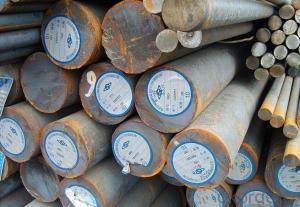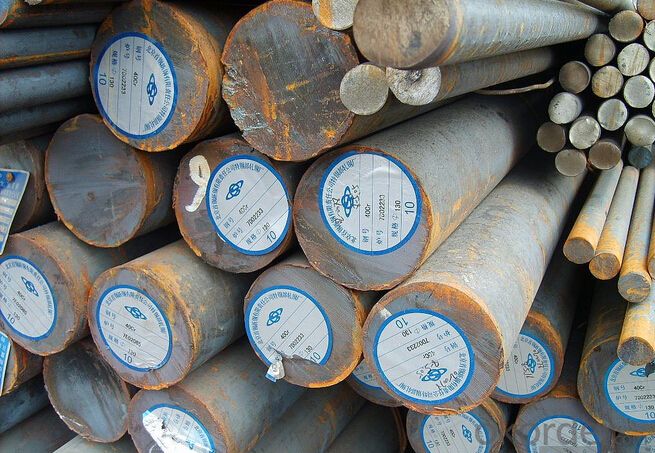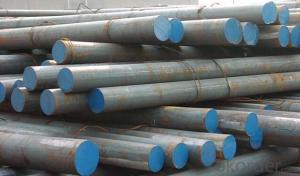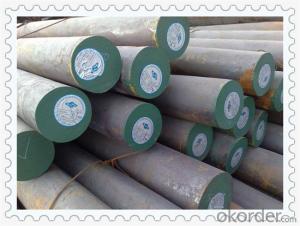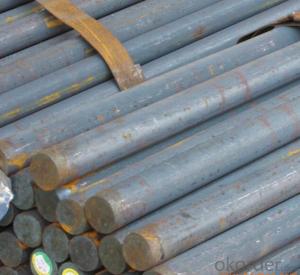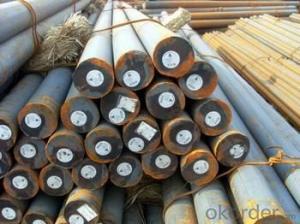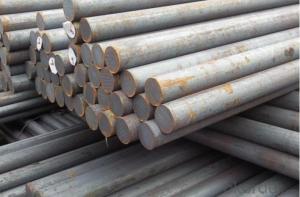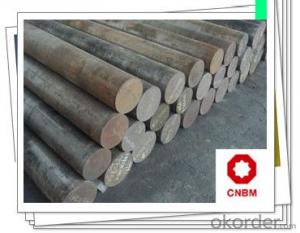Special Steel A36 Carbon Steel Round Bar
- Loading Port:
- China main port
- Payment Terms:
- TT or LC
- Min Order Qty:
- 25 m.t.
- Supply Capability:
- 10000 m.t./month
OKorder Service Pledge
OKorder Financial Service
You Might Also Like
Specification
The details of our Steel
1. Produce Standard: as the GB, AISI, ASTM, SAE, EN, BS, DIN, JIS Industry Standard
2. Produce processes: Smelt Iron -EAF smelt Billet - ESR smelt Billet -Hot rolled or forged get the steel round bar and plate
3. Heat treatment:
Normalized / Annealed / Quenched+Tempered
4. Quality assurance:
All order we can received Third party inspection, You can let SGS, BV,.. and others test company test and inspect our products before Goods shipping.
Product information
1. Main application
(1) this steel is widely used in machinery manufacturing.
(2) For the manufacture of high strength requirements parts, such as gears, shafts, piston pin and the uneven force big machining parts, forgings, stampings and bolts, nuts, pipe joint.
2. Specification:
Round bar | Diameter(mm) | Length (mm) | |
50~500 | 2000~5800 | ||
plate/sheet | Thickness(mm) | Width (mm) | Length (mm) |
20~400 | 80~1000 | 2000~5800 |
3. Delivery condition:
Acc. to your request—Standard steel bar(sawing)
——non-standard steel bar(sawing)
or Mill deliver condition,without sawing or cutting
Conventional or ESR, hot rolled or forged, black surface or milling
Hardness: annealed to HB≤215
4. Features:
(1) Higher strength in a high-quality carbon steel.
(2) Mechanical properties of this steel is very good.
(3) the hardeness of this steel could be 42~46HRC by quenching.
(4) due to poor hardenability, general normalized state, high mechanical performance requirements, the use of quenched and tempered.
(5) Moderate in cold plastic deformation, the machinability by annealing and normalizing is better than quenched and tempered.
5. Chemical analysis
C | Si | Mn | P≤ | S≤ |
0.14~0.22 | ≤0.30 | 0.30~0.65 | 0.045 | 0.045 |
6. Heat treatment (for reference)
quenching | tempering | tensile strength | yield strength | elongation |
820~870 °c | 550~650 °c | ≥600MPa | ≥355MPa | ≥16%
|
Main product
High speed steel | |
AISI | M2,M4,M35,M42,T1 |
DIN | 1.3343,1.3243,1.3247,1.3355 |
JIS | SKH51,SKH54,SKH35,SKH59,SKH2 |
Cold work tool steel | |
AISI | D2,D5,D3,D6,A8,A2,O1 |
DIN | 1.2379,1.2601,1.2080,1.2436,1.2631,1.2363,1.2510,1.2327 |
JIS | SKD10,SKD11,SKD1,SKS3 |
Hot work tool steel | |
AISI | H13,H11,H21 |
DIN | 1.2344,1.2343,1.2367,1.2581,1.2713 |
JIS | SKD61,SKD6,SKD7,SKD5SKT4 |
Plastic mould steel | |
AISI | P20,P20+Ni,420 |
DIN | 1.2311,1.2738,1.2083,1.2316 |
JIS | PDS-3,SUS420J1,SUS420J2 |
Alloy structural seel | |
AISI | 5140,4340,4135,4140 |
DIN | 1.7035,1.6511,1.7220,1.7225 |
JIS | SCr440,SNCM439,SCM435,SCM440 |
Stainless steel | |
AISI | 440C,420,430 |
DIN | 1.4125 |
JIS | SUS440C |
Carbon steel | |
AISI | 1045,1020 |
DIN | 1.1191 |
JIS | S45C, G3101 |
Product show

Workshop show

Shipping
1. FedEx/DHL/UPS/TNT for samples, Door-to-Door;
2. By Air or by Sea for batch goods, for FCL; Airport/ Port receiving;
3. Customers specifying freight forwarders or negotiable shipping methods!
Delivery Time: 3-7 days for samples; 5-25 days for batch goods.
Payment Terms
1.Payment: T/T, L/C, Western Union, MoneyGram,PayPal; 30% deposits; 70% balance before delivery.
2.MOQ: 1pcs
3.Warranty : 3 years
4.Package Informations: 1) EXPORT, In 20 feet (GW 25 ton) or 40 feet Container (GW 25 ton)
2)as customer's requirement
Why choose us?
(1) The leading exporter in China special steel industry.
(2) Large stocks for various sizes, fast delivery date.
(3) Good business relationship with China famous factories.
(4) More than 7 years steel exporting experience.
(5) Good after-sales service guarantee.
- Q: How does special steel contribute to the flexibility of products?
- Special steel contributes to the flexibility of products by providing enhanced strength, durability, and resistance to corrosion. Its unique properties allow manufacturers to design and produce products that can withstand high stress, extreme temperatures, and harsh environments. This flexibility enables the creation of a wide range of products that can be used in diverse industries, including automotive, aerospace, construction, and manufacturing.
- Q: How does special steel contribute to the automotive aftermarket industry?
- Special steel plays a crucial role in the automotive aftermarket industry as it offers enhanced strength, durability, and corrosion resistance compared to regular steel. This allows manufacturers to produce high-performance components such as engine parts, chassis components, and suspension systems. Additionally, special steel's unique properties enable the creation of lighter and more fuel-efficient vehicles. Its contribution to the aftermarket industry lies in providing the necessary materials for the production of high-quality and long-lasting aftermarket parts that meet the demands of vehicle customization and performance upgrades.
- Q: What are the different types of welding techniques used for special steel?
- There are various types of welding techniques used for special steel, depending on the specific requirements and properties of the steel being used. Some of the common welding techniques for special steel include: 1. Shielded Metal Arc Welding (SMAW): Also known as stick welding, SMAW uses a consumable electrode coated in flux to create an electric arc between the electrode and the base metal. This technique is commonly used for thicker sections of special steel due to its high heat input and deep penetration. 2. Gas Metal Arc Welding (GMAW): Also known as MIG welding, GMAW uses a continuously fed wire electrode and a shielding gas to protect the weld from atmospheric contamination. This technique is versatile and widely used for special steel due to its ability to produce high-quality welds with good control. 3. Gas Tungsten Arc Welding (GTAW): Also known as TIG welding, GTAW uses a non-consumable tungsten electrode and a shielding gas to create an electric arc. This technique is often used for special steel alloys that require precise control over the welding process and where the weld quality and appearance are critical. 4. Flux-Cored Arc Welding (FCAW): Similar to GMAW, FCAW uses a continuously fed tubular electrode filled with flux. This technique is commonly used for special steel applications that require high deposition rates and deep penetration, such as in heavy fabrication or structural welding. 5. Submerged Arc Welding (SAW): SAW involves the formation of an arc between a continuously fed bare electrode and the workpiece, while a layer of granular flux covers the arc. This technique is typically used for heavy-duty applications and thick materials, providing high deposition rates and excellent weld quality. 6. Laser Beam Welding (LBW): LBW uses a highly focused laser beam to melt and join the special steel parts. This technique offers precise control, high welding speeds, and minimal distortion, making it suitable for specialized applications that demand high precision and minimal heat-affected zones. It is important to note that the selection of the appropriate welding technique for special steel depends on factors such as material composition, thickness, joint configuration, and desired weld properties. Proper knowledge and expertise are required to determine the best welding technique for a specific application to ensure optimal results in terms of weld quality, strength, and durability.
- Q: Can special steel be used in renewable energy applications?
- Yes, special steel can be used in renewable energy applications. Special steel alloys such as stainless steel and high-strength low-alloy (HSLA) steel are commonly used in the manufacturing of wind turbines, solar panels, and hydroelectric power systems. These alloys offer excellent corrosion resistance, high strength, and durability, making them ideal for withstanding harsh environmental conditions and ensuring long-term performance in renewable energy applications.
- Q: What are the main applications of special steel in the food packaging industry?
- Special steel is widely used in the food packaging industry due to its unique properties and benefits. One of the main applications is in the production of food cans and containers. Special steel provides excellent corrosion resistance, ensuring the preservation and safety of food products. It also offers high strength and durability, allowing for efficient handling and transportation. Moreover, the hygienic nature of special steel prevents contamination and ensures the maintenance of food quality. Overall, special steel plays a crucial role in the food packaging industry by providing reliable and sustainable packaging solutions.
- Q: How does molybdenum improve the performance of special steel?
- Due to its unique properties and characteristics, molybdenum is crucial in enhancing the performance of special steel. Its role is multi-faceted and includes improving strength and toughness, increasing hardenability, enhancing corrosion resistance, and improving high-temperature strength and creep resistance. One of the primary benefits of molybdenum is its ability to significantly improve the strength and toughness of steel, making it more durable and resistant to deformation. This is achieved by forming a solid solution with iron, resulting in a fine-grained microstructure and reducing the formation of brittle phases in the steel. Another advantage of molybdenum is its impact on the hardenability of steel. It allows the steel to be heat-treated to achieve the desired mechanical properties. This is particularly important in the production of special steel, where high strength, wear resistance, and thermal stability are often required. By enabling effective heat treatment, molybdenum ensures that the steel can be processed to meet specific performance requirements, such as hardness, toughness, and dimensional stability. Moreover, molybdenum enhances the corrosion resistance of special steel, making it suitable for challenging environments. It forms a protective oxide layer on the steel's surface, acting as a barrier against corrosive substances like acids, alkalis, and salts. This corrosion resistance is crucial in applications where the steel is exposed to harsh conditions, such as marine environments, chemical processing plants, and oil and gas industries. Furthermore, molybdenum improves the high-temperature strength and creep resistance of special steel. It enables the steel to maintain its mechanical properties even at elevated temperatures, making it suitable for applications where the steel is subject to prolonged exposure to heat or mechanical stress. In conclusion, molybdenum plays a vital role in enhancing the performance of special steel by improving its strength, toughness, hardenability, corrosion resistance, and high-temperature properties. These attributes make molybdenum an essential alloying element in the production of special steel for various industries, including automotive, aerospace, energy, and tool manufacturing.
- Q: What are the different shot blasting techniques used for special steel?
- There are several shot blasting techniques used for special steel, including wheel blasting, air blasting, and centrifugal blasting.
- Q: What are the main advantages of using special steel in the construction of bridges?
- The main advantages of using special steel in the construction of bridges are its high strength, durability, and resistance to corrosion. Special steel, such as high-strength low-alloy steel or weathering steel, can withstand heavy loads and extreme weather conditions, making it ideal for bridge construction. Its superior strength allows for the design of lighter and more cost-effective structures. Additionally, special steel's resistance to corrosion reduces maintenance and repair costs, ensuring the longevity and safety of the bridge.
- Q: How does special steel contribute to the power generation sector?
- The power generation sector greatly relies on special steel due to the numerous benefits it offers and its contribution to the overall efficiency and reliability of power generation equipment. Special steel plays a vital role in this sector by providing superior strength and durability, which is essential given the demanding and extreme conditions involved in power generation, such as high temperatures, pressure, and corrosive environments. By being specifically designed to withstand these harsh conditions and maintain its structural integrity, special steel ensures the long-term reliability and safety of power generation equipment. Various components of power generation equipment, including turbines, boilers, and generators, benefit from the use of special steel. For instance, gas turbines utilize special steel for the construction of turbine blades and vanes, which endure immense heat and rotational forces. Special steel's high-temperature resistance and strength enable these components to operate efficiently at elevated temperatures without deformations or failures, thus enhancing the performance of gas turbines. Furthermore, special steel exhibits excellent corrosion resistance, making it suitable for power plants that employ water-based cooling systems. These cooling systems often use seawater or chemically treated water, which can be highly corrosive. By incorporating special steel in critical components like condensers and heat exchangers, the power generation sector significantly reduces maintenance and replacement costs associated with corrosion-related issues. Moreover, special steel plays a crucial role in the construction of nuclear power plants. It is utilized in the fabrication of reactor pressure vessels, steam generators, and fuel assemblies. The radiation resistance and high strength of special steel ensure the safety and reliability of these components in nuclear power plants, thereby contributing to the overall efficiency and sustainability of the power generation sector. In conclusion, special steel's exceptional strength, high-temperature resistance, corrosion resistance, and radiation resistance make it an indispensable material in the power generation sector. Its usage enhances the efficiency, reliability, and safety of power generation equipment, ultimately contributing to the growth and sustainability of the power generation industry as a whole.
- Q: What industries commonly use special steel?
- Industries commonly using special steel include automotive, aerospace, construction, energy, and manufacturing.
Send your message to us
Special Steel A36 Carbon Steel Round Bar
- Loading Port:
- China main port
- Payment Terms:
- TT or LC
- Min Order Qty:
- 25 m.t.
- Supply Capability:
- 10000 m.t./month
OKorder Service Pledge
OKorder Financial Service
Similar products
Hot products
Hot Searches
Related keywords
